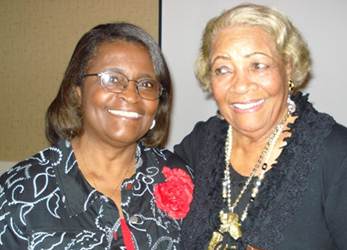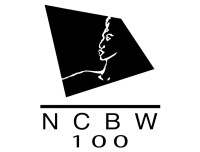The National Coalition of 100 Black Women: The Advocate for the Health, Education, and Economic Empowerment of Black Women
In the winter of 1970 in New York City, 24 Black women, led by visionary Edna Beach, began meeting in their homes to assess the problems and opportunities left behind in the wake of the turbulent 1960s. As a result of their meetings, they formed the Coalition of 100 Black Women. For the rest of the 1970s, they slowly but persistently worked to master root causes of issues that affected their families, their communities and themselves. They boldly began to reach out to other Black women in common cause, and eventually, mobilized their emerging stature as a visible force of influence promoting gender and racial equity.
In 1981, the New York Coalition had over 500 members throughout New York City’s metropolitan area, far in excess of the symbolic “100” in its title. Its effective role-model projects and its association with grass-roots community activity won notice in both local and national news media. As the Coalition gained recognition, Black women from other parts of the country aspired to duplicate its mission and programs in their own geographic areas.
In 1981, it decided to create a national organization, to expand beyond the boundaries of New York City, and, accordingly, to include the term “National” in the original title. The National Coalition of 100 Black Women (NCBW) was launched on October 24, 1981, with representatives from 14 states and the District of Columbia, with Jewell Jackson McCabe as its first national president. The rapidity by which the organization grew is attested to by the statistics of 1986: 47 chapters in 19 states, with a membership of 3,000. Discussions at meetings and other gatherings grew more and more serious and wide ranging. The consensus of the organization in 1986 is perhaps best summed up in the paragraph from its initial newsletter:

“No longer can Black women operate on the basis of reacting to crises and depending on crash programs to solve them.. They know, as they have in the past, that they must understand and direct present trends and become aware of the new economic and social realities that are emerging. Seeking empowerment as a distinct group, they need to analyze their attitudes about power and understand both the traditional and unconventional routes to power. Most importantly, Black women are the linchpin of leadership continuity among all Black people and understand the need for mentoring that must be nurtured and honed day by day, from one generation to another.”
Today, NCBW consists of thousands of progressive women of African descent who represent 60 chapters in 25 states and the District of Columbia and whose commitment to gender equity and socioeconomic advancement drives meaningful change to benefit women of color. Its mission is to advocate on behalf of women of color through national and local actions and strategic alliances that promote the NCBW agenda on leadership development and gender equity in the areas of health, education and economic empowerment. To meet the diverse needs of its members, NCBW implements programs that…
• provide an effective network among Black women,
• establish links between NCBW and the corporate and political sectors,
• enable Black women to be a visible force in the socioeconomic arena,
• meet the career needs of these women and facilitate their access to mainstream America,
• use the tools of role modeling and mentoring to provide meaningful guidance to young women, and
• recognize the historic and current achievements of Black women.
NCBW’s unique strengths derive from the units that have proven to be the building blocks of national organizations with longevity: its local chapter structure and the members it is able to attract and mobilize. Membership is open to all Black women who want to make a difference in their communities. The idealism demonstrated by members, both young and old, has enabled NCBW to bridge the much-deplored generation gap in Black organizations. Each chapter is driven by a committee structure with concrete programs and activities. Members on the committees—education, arts and culture, economic development, health, political action, public relations, and civic and community service—initiate and develop programs that respond to the specific character of each community in which NCBW is based.
Most NCBW members have completed college and hold a professional position. In the major cities of America, NCBW lays claim to physicians, dentists, lawyers, judges, corporate executives, media personalities, educators, entrepreneurs, and an array of other skilled professionals from the public and private sectors. This wealth of resource talent is necessary not only for the achievement of the programmatic aims of the organization but also for effective interface with other groups in our society. Nationally, NCBW’s board members participate actively in networks of all kinds, linking the organization not only to other organizations with similar agendas but also to various corporate structures and to influential individuals in fields that span the gamut of human endeavor. By having such access, the leadership of NCBW can readily gauge the sentiment of any sector of society and certainly has no difficulty in determining the mood or thoughts of Black women across the United States for effective advocacy programmatic purposes.
The NCBW governs its membership and accounts for chapter operations under its 501(c)(4) status. It promotes its advocacy and related program activity under the NCBW/Community Services Fund (CSF), its 501(c)(3) partner. NCBW/CSF (the Fund) accepts program dollars and functions as NCBW’s operating account. This separation and governance structure was recommended by our earliest national funder, the Ford Foundation, and has continued since the 1980s. Founded in 1984, the NCBW/Community Services Fund, a not-for-profit, 501(c)(3) corporation, develops programs around the advocacy and program priorities of its sister organization, the NCBW. Those priorities were established at our founding in 1981 and include health, education and economic development, with leadership development and gender equity defined as the cornerstone of our advocacy efforts. In l998, our advocacy agenda expanded its reach to include other women of color—Asian and Pacific Islander, Latino and Native American.
The Fund maximizes its service capability via programming through the 60 NCBW chapters. The programs are administered, with the assistance of the volunteer NCBW leadership, by the Fund’s full- and part-time staff. In keeping with the cornerstone of its mission, namely that of advocacy by and for black professional women, the NCBW has furthered an array of advocacy initiatives and programs benefitting black women and other women of color.
The NCBW continues its legacy of “building partnerships through creative alliances”, with the current national administration working to Link-Leverage-Lead in its work to ensure a relevant “new millennium” agenda reflecting the contemporary issues and solutions to the barriers encountered by women of color in achieving gender and racial equity. We promote the organizational mission and our partnerships through the national website at www.nc100bw.org, and our work “on the ground” is accomplished by the chapters.
